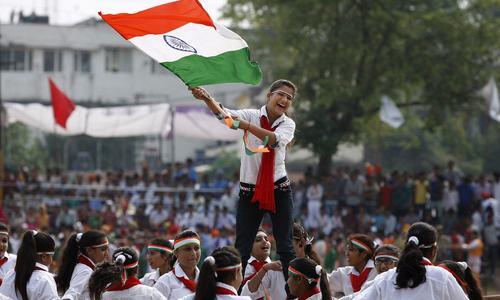Big powers’ pressure may win India NSG entry, fear Pakistani officials
ISLAMABAD: Pakistani officials feel encouraged by growing support in the Nuclear Suppliers Group (NSG) for establishing criteria for membership of non-NPT countries, but are wary of big powers’ pressure on smaller countries that could pave the way for exemptions for India in the admission process.
“There are a lot of countries that now recognise the need for a criteria-based approach rather than granting exemptions, but pressures are still being exerted on smaller countries,” Director General of Disarmament at the Foreign Office Kamran Akhtar said while speaking at a workshop on ‘Defence, Deterrence and Stability’ in South Asia.
The workshop was jointly organised by Islamabad-based think-tank Centre for International Strategic Studies (CISS) and London’s International Institute for Strategic Studies (IISS).
Last month in Vienna NSG members, for the second time in a year, failed to reach consensus on the admission of non-NPT countries.
The NSG members have been divided between countries demanding strict adherence to the NPT criteria and the bloc wanting to embrace India immediately.
A growing support within NSG has been noted for developing criteria for non-NPT states and the Chinese proposal for a two-step approach for new admissions which involves developing criteria in the first stage and then inviting applications for the membership.
“We are pretty confident that NSG countries would not go down the exemption way, but if they ultimately do so and give exemption to India, there would be serious repercussions not just for Pakistan, but also for other non-nuclear weapon states that may feel being unjustly denied their right to peaceful uses of nuclear energy,” Mr Akhtar said.
He said it was now up to NSG countries to decide if they wanted the group to be seen as being driven by political and commercial interests or else they would want non-proliferation goals to be strengthened.
The official warned that strategic stability in South Asia would be undermined if Pakistani application was not treated equally with the Indian case.
The Director General of Arms Control and Disarmament Affairs (ACDA), Strategic Plans Division, Khalid Banuri, said: “Pakistan wants to deny India space for war and create a space for peace. Its (Pakistan’s) weapons are for maintaining peace in the region and for deterrence.”
FO’s Additional Secretary Tasneem Aslam said the issue of membership of non-NPT countries was deeply linked to strategic stability in South Asia.
“Today, the NSG stands at crossroads, once again, as it considers membership for non-NPT states. An even-handed and non-discriminatory approach by the NSG at this juncture would be of far-reaching significance for strategic stability in South Asia and global non-proliferation efforts,” she said and recalled that the NSG had missed in 2008 the opportunity to promote adherence to non-proliferation regime by granting waiver to India.
Ms Aslam also touched on escalation with India and regretted the world silence on the matter. The world’s indifference, she believed, encouraged India to adopt a strident policy vis-à-vis Pakistan.
“Unfortunately in bilateral context Pakistan and India seem to be moving backwards, which is not a good sign,” Ms Aslam said, while warning that India was upping the ante through dangerous rhetoric and risky claims of surgical strikes, besides attempting to violate Pakistan’s maritime boundary.
There was a consensus among the speakers during the session on ‘Tensions with India’ that there was dangerous escalation in the region and political leadership on both sides of the border needed to show political resolve and vision for de-escalation. They noted that absence of official dialogue made the situation particularly perilous as chances of misunderstanding increased.
Senior Fellow for South Asia at IISS Rahul Roy Chaudhury said that relations between India and Pakistan were at the lowest point since the 2008 Mumbai attack. He noted that worryingly “nuclear rhetoric and nuclear signalling” had occurred and that he saw little chance of progress towards ending the stalemate unless both Delhi and Islamabad made compromises.
Mr Chaudhury made an eight-point proposal for rebuilding confidence that could eventually lead to resumption of dialogue. The suggestion included lowering of rhetoric, effective implementation of ceasefire, observance of restraint by media, speedy completion of trials of Mumbai and Pathankot suspects, India preventing excesses by security forces in Kashmir, Pakistan extending the scope of its counter-terrorism operations, reiteration by Delhi of its interest in seeking peaceful resolution to the Kashmir issue, and start of a back-channel dialogue especially a conversation between intelligence agencies.
Former foreign secretary Riaz Khokhar urged a ‘direct dialogue’ between India and Pakistan. He feared that back-channel talks could lead to more misunderstanding. He said that leaders of both countries needed to show political will.
IISS Senior Fellow for Land Warfare retired Brig Ben Barry talked about the influence of non-state actors on the dispute. “Further or more serious attack by non-state actors in Kashmir or (mainland) India could produce a dynamic change of military escalation on both sides,” he warned.
Analyst and scholar Dr Hassan Askari Rizvi stressed the need for flexibility for forward movement in ties. He said the importance of political resolve for resolving such a stalemate should not be under-estimated, but the problem was that Indian leadership was not willing to talk.
Published in Dawn December 14th, 2016













































